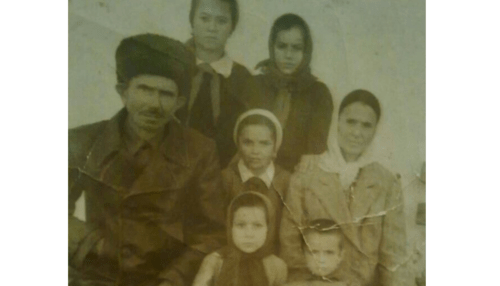
28 February 2024, 18:57
Norwegian Helsinki Committee recalls the consequences of mass deportation of Chechens and Ingush
The deportation of Chechens and Ingush led to territorial conflicts, wars and broken families, the Norwegian Helsinki Committee has stated in an article dedicated to the 80th anniversary of the deportation. The material describes the story of a Chechen family who survived deportation.
The "Caucasian Knot" has reported that the day of February 23 marked the 80th anniversary of the Stalin’s deportation of the Chechens and Ingush. In Grozny, Chechen officials and MPs held a rally in memory of the victims of the Stalin’s repressions. The event took place without the participation of Ramzan Kadyrov.
On 23 February 1944, the mass deportations of the Chechen and Ingush peoples to Central Asia began. “Perhaps future generations will look at the deportations like I do when I read about Caucasian wars in the 18th and 19th centuries,” says Usam, an ethnic Chechen from Samashki, a town the Achkhoi-Martan district of Chechnya. “But for me, they are part of the life story of my parents. The deportations are still not part of the past.”
On 23 February 1944, NKVD officers began walking from house to house to round up the entire population of the Checheno-Ingush ASSR, in what many now refer to as “Aardakh” (Exodus). People were given practically no time to gather their belongings. Resistance to the NKVD was met with mass executions, as thousands were systematically brought to the lowlands and loaded onto cattle carts. The largest numbers, hundreds of thousands of individuals, were sent to present-day Kazakhstan and Kyrgyzstan, with smaller numbers to Siberia and other eastern regions.
Due to the fact that many Chechen villages are located in inaccessible, mountainous regions, several thousand people left their homes and relocated to Dagestan, Azerbaijan and Georgia. However, NKVD tracked them down and deported them to Central Asia, alongside those who at the time were fighting the Germans as soldiers in the Red Army, says an article published by the Norwegian Helsinki Committee "80 years since the mass deportations of the Chechens and Ingush".
"Perhaps future generations will look at the deportations like I do when I read about Caucasian wars in the 18th and 19th centuries," says Usam, an ethnic Chechen from Samashki, a town the Achkhoi-Martan district of Chechnya. "But for me, they are part of the life story of my parents. The deportations are still not part of the past."
Usam is a 59 year-old Chechen, currently living in Norway. Usam’s father was barely 3 years old when the NKVD came to collect him and his entire family, including his parents and three sisters. The family was deported to the steppes of Kazakhstan, where the sisters died from typhus. Usam’s father was the only survivor. To this day, the memory of his sisters who died in exile pains him greatly.
"My grandmother on my mother’s side became ill soon after the arrival to Kazakhstan. She gave birth to a boy who was taken away from her and she never saw him again. She kept looking for him, to no avail and she continued to search for him even after she returned home to Chechnya. At some point she met a lonely young boy and convinced herself that this was her lost son and adopted him. This calmed her heart and a few years later she died," he says.
Nowadays, when he returns to Chechnya, Usam goes to show his respect to his ancestors and visits his family graves.
The Chechens and the Ingush are indigenous peoples of the North-Eastern Caucasus. Their language – Noxçiyn mot – is a linguistic group of its own. They have a long history of fierce resistance to Russian imperialism, beginning with a major war in 1785. Over one century, the numbers of Chechens and Ingush dropped dramatically as a result of war and expulsion. Resistance to Russian rule was evident also in Soviet times and resulted in two wars of independence from 1994-1996 and again from 1999 until around 2009.
"Stalin’s justification for the deportation of Chechens, Ingush and several other people was collaboration with the Germans. But German troops didn’t even occupy a single Chechen village. So what sort of collaboration can you even speak of? What is true, is that part of the Chechen population stood up against Soviet Russia during the Stalin era," Usam says.
Soviet sources claim 496,000 Chechens and Ingush were deported, while later Chechen sources put the figure at 650,000. Estimates of deaths during transport and in settlements range from 123,000 to 200,000 and even beyond. The impact on the Chechen and Ingush peoples was immense.
After Stalin’s death on 5 March 1953, the Central Committee of the Communist Party overturned the decree stating that all deported peoples – including the Chechens and Ingush – must remain in permanent exile. Already in 1954, some tried returning to Chechnya but were sent back. Soviet authorities tried establishing Chechen “autonomies” in Uzbekistan, but they were adamant to return to their homeland. In general, Chechens began returning home even sooner than other deported peoples, once they had the opportunity.
Upon their return, Ingush found that the so-called Prigorodny District had been transferred from the Checheno-Ingush ASSR to neighbouring North Ossetian ASSR. Houses had been taken over by Ossetians, and returning Ingush faced considerable hostility. Eventually, this led to the Prigorodny conflict of 1992, when several hundred people were killed in clashes between Ingush militas and North Ossetians security forces
"For me, the deportations are not just a question of justice and injustice. We have always been a bone in the throat of the Russian empire, and to be honest it’s part of our self-esteem. An enormous number of Chechens took part in the last two wars merely out of a wish to get back for the suffering their parents had to endure at the time of the deportations. Especially during the first war, you could hear fighters saying that they would not permit another round of violations against the Chechen people by Russians. In some ways, 1994 was a revenge for 1944," Usam has concluded.
This article was originally published on the Russian page of 24/7 Internet agency ‘Caucasian Knot’ on February 28, 2024 at 06:30 pm MSK. To access the full text of the article, click here.





Комментирование через Кавказский узел